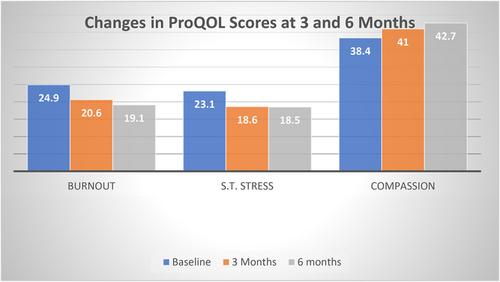There is an abundance of research demonstrating the growing challenge of burnout in healthcare professionals. This has been further exacerbated by the COVID-19 pandemic. The use of meditation using various techniques has shown promising results in the reduction of stress and its sequelae.
To determine the efficacy of a mantra-based meditation protocol developed by the American Meditation Institute to reduce caregiver stress by evaluating changes in burnout and secondary traumatic stress (components of compassion fatigue) and compassion satisfaction with the application of the meditation protocol.
This pre–post cohort analysis was conducted on prospective enrollees of the Continuing Medical Education (CME)-accredited American Meditation Institute's annual Heart and Science of Yoga® Conference, a comprehensive training in Yoga Science as Holistic Mind/Body Medicine for physicians and other healthcare providers held in October in Lenox, Massachusetts. Enrollees were trained in mantra-based AMI Meditation at the conference and monitored during the 6-month period following the conference.
The mantra-based AMI Meditation intervention included a 5-day in-person training, a daily practice of a guided mantra-based AMI Meditation using a 20-min CD or MP3 recording, and receipt of a monthly motivational letter. Study participants completed the Professional Quality of Life (ProQOL) Measure (a survey) and a demographic survey at baseline, and the ProQOL Measure and an informational survey at 3 and 6 months.
The primary outcome was a change from baseline in participants’ level of burnout using the ProQOL assessed at baseline and 3 and 6 months. Secondary outcomes included change from baseline in participants’ level of secondary traumatic stress and compassion satisfaction assessed at 3 and 6 months using the ProQOL Measure. Qualitative data were also collected from participant feedback, via the informational surveys, at 3 months and after completion of the program at 6 months.
Of the 54 participants who enrolled and completed a baseline survey, 30 completed the follow-up at 3 months and 21 participants completed the follow-up at 6 months. From baseline to 6 months, there were statistically significant improvements in the scores for all three ProQOL scales. Using paired t-test, burnout scores were reduced by 23.2% (p < 0.0001), secondary traumatic stress scores were reduced by 19.9% (p = 0.001), and compassion satisfaction scores improved by 11.2% (p < 0.0001). For secondary traumatic stress and compassion satisfaction scores, most improvements were seen at 3 months. For burnout, the improvements were constant across the 3- and 6-month follow-ups.
In this small cohort of healthcare professionals, the mantra-based AMI Meditation program significantly improved all three domains of caregiver stress with improvements in burnout and secondary traumatic stress as well as improvements in feelings of compassion. This adds to a rapidly growing body of research supporting the critical importance of these tools and skills in the mitigation of caregiver stress.


